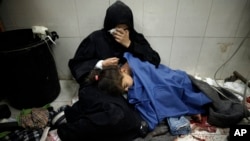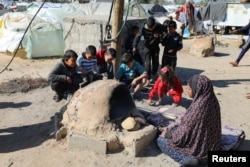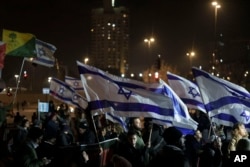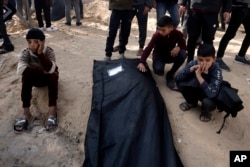Gaza’s Health Ministry said Friday that the territory’s death toll has climbed to more than 26,000 people with more than 64,400 wounded in more than three months of war.
The ministry said early Friday that in the last 24 hours, 183 Palestinians have been killed in Israeli strikes and 377 have been injured.
The Israeli military said it is investigating an attack on Thursday that killed at least 20 people and wounded another 150 at a traffic circle in Gaza City as Palestinians waited for humanitarian aid, Hamas health officials said.
Also in central Gaza, Palestinian health officials said a nighttime Israeli airstrike on a house in Al-Nusseirat refugee camp killed six people.
The death toll from a Wednesday strike on a United Nations training center in Khan Younis in southern Gaza has risen to 12, with more than 75 wounded, according to Thomas White, a senior official with the United Nations agency for Palestinian refugees.
The U.N. relief agency did not directly blame Israel, although earlier it had said the facility was hit by tank fire and Israel is the only force with tanks in Gaza’s second-largest city. The Israeli military said it had "currently ruled out" that the strike was carried out by its aircraft or artillery but that it was still investigating the attack.
It said the building might have been hit by a Hamas rocket.
The fighting is part of Israel’s efforts to end Hamas’ control of the Gaza Strip since the October 7 attack, when Hamas militants invaded southern Israel, killed about 1,200 people and took about 250 people hostage.
The fighting has severely disrupted the flow of humanitarian aid into Gaza, and the international charity ActionAid said on Thursday that hunger there has reached catastrophic levels, prompting people to grind animal feed to use as flour.
“Famine is looming across the territory,” ActionAid said in a statement, “while pockets of famine are strongly suspected in the north, where it is extremely challenging for aid to reach.”
ActionAid also reports water is so scarce that people in Gaza have access to only 1.5 to 2 liters of water per day for all their needs, including sanitation.
Adding to the misery, the United Nations said the weather has turned rainy and chilly, raising fears of illness.
"It was entirely predictable at this time of the year, and risks making an already unsanitary situation completely uninhabitable for the people. Most have no more clothes or blankets," said Ajith Sunghay, head of the U.N. Human Rights Office for the Occupied Palestinian Territory.
Meanwhile, the U.S. government has created a channel with Israel to discuss concerns about incidents in Gaza in which civilians have been killed or wounded by Israeli attacks, and civilian infrastructure has been targeted, according to a Thursday report by Reuters.
The channel was established after a meeting earlier this month between U.S. Secretary of State Antony Blinken and Israel’s war Cabinet.
A senior U.N. official called Thursday for "every measure" to be taken to protect civilians, following the Wednesday attack at the Khan Younis training center, where thousands of displaced Palestinians have been staying.
The U.N.’s White said the situation in Khan Younis shows a "consistent failure to uphold the fundamental principles of humanitarian law."
"Persistent attacks on civilian sites in Khan Younis are utterly unacceptable and must stop immediately," White said. "People are being killed and injured. As fighting intensifies around hospitals and shelters hosting the displaced, people are trapped inside, and lifesaving operations are impeded."
The United States, which has been a key Israeli ally in its war against Hamas, condemned the training center attack.
State Department spokesman Vedant Patel said, "You've heard me say it before, you've heard [Secretary of State Antony Blinken] say it before, but civilians must be protected, and the protected nature of U.N. facilities must be respected. And humanitarian workers must be protected so that they can continue providing civilians with the life-saving humanitarian assistance that they need."
Philippe Lazzarini, head of the U.N.’s Palestinian relief agency, said the Khan Younis compound had been clearly marked as a U.N. facility, and its coordinates had been shared with Israeli authorities.
The head of the World Health Organization called for a cease-fire to the conflict in an address to the organization’s governing body Thursday, during which he described the conditions in Gaza as “hellish.”
“War doesn't bring solution, except more war, more hatred, more agony, more destruction. So, let's choose peace and resolve this issue politically," WHO Director-General Tedros Adhanom Ghebreyesus told the WHO Executive Board in Geneva.
The U.S. and some Middle East countries are trying to negotiate a new cease-fire to halt the fighting, perhaps for 30 days, to allow the release of more hostages and the release of jailed Palestinians held by Israel. About 100 hostages held by Hamas and 240 Palestinians jailed by Israel were freed in a late November week-long cease-fire.
But no new cease-fire agreement has been reached.
Some information for this report was provided by The Associated Press, Agence France-Presse and Reuters.








